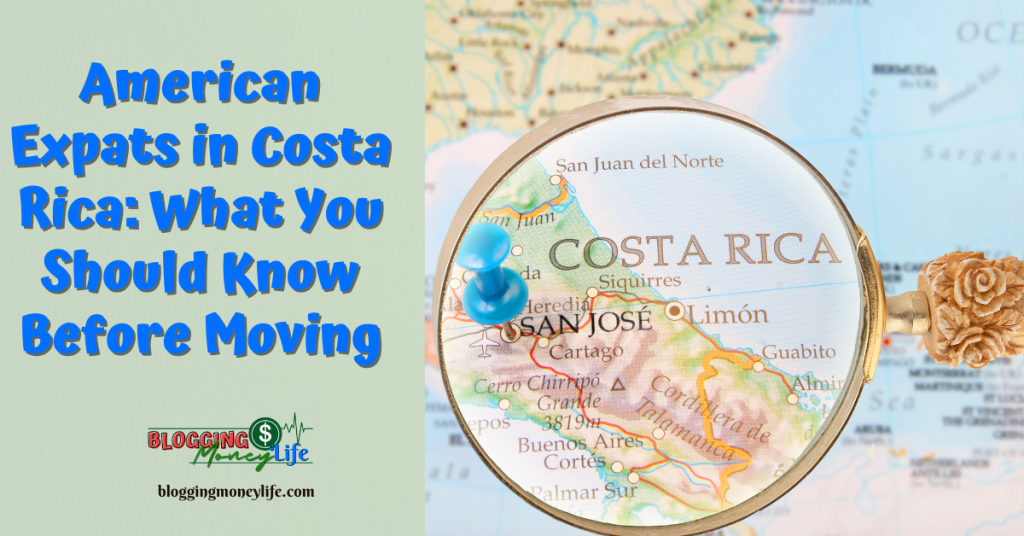American Expats in Costa Rica: What You Should Know Before Moving

As the beauty of tropical paradises is becoming popular, an increasing number of Americans are making the big move to Costa Rica as expats. This Central American country, known for its breathtaking natural beauty, tropical weather, hospitable locals, and laid-back lifestyle, has become a hotspot for expatriates seeking a new life.
However, before this life-changing journey, you must arm yourself with basic yet essential knowledge about what awaits in your new home away from your country. My husband and I moved to Costa Rica and have been here for two years. Watch our 2-year update below.
Choosing Costa Rica: Factors to Consider
This beautiful country offers diverse climates and landscapes, from the lush rainforests of the Central Valley to the pristine beaches along the Pacific coast. Understanding the variations in weather and topography is crucial in choosing the region that suits your preferences and lifestyle.
One of the benefits for American expats is the relatively low cost of living in Costa Rica compared to the United States. By analyzing expenses such as housing, groceries, and healthcare, you can better assess how far your dollar will stretch in this tropical paradise. Factors such as the low cost of living and availability of fresh produce contribute to a low-key lifestyle.
Visa and Residency Options
Discussing visa and residency options is crucial for American expats planning to relocate to Costa Rica. Understanding the requirements and processes for obtaining residency and weighing the pros and cons of each option can save you time and hassle in the long run. The Rentista program and permanent residence offer different paths to establishing legal status.
Here’s a closer look at some common pathways to residency:
Rentista Program
Pros:
- Allows individuals with a stable income stream from investments or pensions to qualify for residency.
- Flexibility in income requirements, as there is no set minimum but rather a requirement to demonstrate stable monthly income.
- Exemption from taxation on foreign income for the first two years.
Cons:
- Requires proof of consistent income, which may be challenging for some applicants.
- An initial deposit of funds into a Costa Rican bank account is necessary.
- Must renew residency every two years and demonstrate continued income eligibility.
Permanent Residency
Pros:
- Provides long-term residency status without the need for renewal every few years.
- Opens up more opportunities for employment and business ownership.
- Eligibility for Costa Rican social security benefits after contributing to the system for a certain period.
Cons:
- Stricter requirements compared to other residency options, such as demonstrating a clean criminal record and providing complete documentation.
- Longer processing times and potentially higher fees compared to other residency options.
- It may require proficiency in the Spanish language for specific categories of permanent residency.
Healthcare System
The healthcare system is a crucial aspect of expat life in Costa Rica. Understanding the quality of healthcare services, available insurance options, and tips for maintaining a healthy lifestyle can impact an expat’s well-being.
Currently, Costa Rica boasts a comprehensive healthcare system that is both accessible and affordable. The country has a mix of public and private healthcare facilities, with the public system known for its high standards and the private sector offering more specialized services.
Public hospitals and clinics, known as the Caja Costarricense de Seguro Social (CCSS), provide healthcare services to residents and citizens, including expats with legal residency. On the other hand, private hospitals and clinics offer a higher level of comfort, shorter wait times, and access to specialized treatments. Expats often opt for private healthcare through out-of-pocket payments or private health insurance plans.
Health Insurance Options for Expats
Expats have several options for health insurance coverage in Costa Rica:
- Caja Costarricense de Seguro Social (CCSS): Expats with legal residency can enroll in the national healthcare system and pay monthly premiums based on income. This option provides access to public hospitals and clinics but may have longer wait times for non-emergency services.
- Private Health Insurance: Many expats purchase private health insurance plans from local or international providers. These plans offer more comprehensive coverage, including access to private hospitals and clinics, specialist care, and shorter wait times.
- International Health Insurance: Some expats opt for international health insurance plans that provide coverage both in Costa Rica and abroad. These plans offer flexibility and may include additional benefits such as emergency medical evacuation and repatriation.
Tips for Maintaining a Healthy Lifestyle in Costa Rica

Living in Costa Rica offers ample opportunities for a healthy and active lifestyle. Here are some tips for maintaining optimal health as an expat:
- Eat a Balanced Diet
- Stay Active
- Practice Preventive Care
- Stay Hydrated
- Protect Against Mosquito-Borne Illnesses
By understanding the Costa Rican healthcare system, exploring health insurance options, and adopting healthy lifestyle habits, expats can prioritize their well-being and enjoy a fulfilling life in this tropical paradise with a big expat community waiting.
Employment Opportunities
Securing employment is a crucial aspect of expat life in Costa Rica. Understanding the job market, exploring remote work options and entrepreneurship opportunities, and navigating work permits and legal requirements are essential for expats seeking employment in the country. Here’s an in-depth look at each aspect:
The job market in Costa Rica offers plenty of opportunities across various sectors, including tourism, hospitality, technology, and finance. American expats with skills and expertise in these industries may find ample employment opportunities in multinational corporations and local businesses.
Key industries driving employment in Costa Rica include technology and outsourcing, with many global companies establishing operations there. Moreover, the tourism sector offers seasonal employment opportunities in popular tourist destinations.
Expats seeking employment in Costa Rica must have work permits and legal requirements ready to work legally. While citizens of certain countries, including the United States, enjoy visa-free entry to Costa Rica for tourism purposes, obtaining a work permit requires additional steps and documentation.
The type of work permit required depends on the nature of work, duration of stay, and individual circumstances. It is an excellent option to apply for temporary or permanent residency status to work legally in Costa Rica, with temporary residency typically granted for employment purposes.
Education for Expat Children
Costa Rica offers a comprehensive education system, with public and private schools available nationwide. Education is mandatory for children between 6 and 15, with primary and secondary education free in public schools.
Costa Rica has many international schools and bilingual education programs for expat families seeking an English-language education or bilingual curriculum. These schools typically follow international curricula such as the International Baccalaureate (I.B.) or American curriculum, providing a familiar learning environment for expat children.
Parents must research and select the right educational institution based on their child’s needs and preferences to ensure a smooth transition for expat children. Visiting potential schools, meeting with administrators, and connecting with other expat families can help expat children acclimate to their new school environment and make the transition as smooth as possible.
Housing and Real Estate
When deciding between renting and buying property in Costa Rica, expats should consider their long-term plans, financial situation, and personal preferences. Renting offers flexibility and minimal commitment, making it ideal for a recent temporary resident who is unsure about their future plans or prefers not to tie up capital in real estate.
Costa Rica has a lot of expat-friendly communities and neighborhoods that cater to different lifestyles and preferences. From beachfront towns to mountain retreats, expats can find diverse options to suit their needs. Some popular expat communities include Tamarindo, Jaco, Escazu, and Atenas, offering unique amenities, attractions, and expat support networks.
Here are some tips to find the best housing in Costa Rica:
- Research Extensively
- Work with Local Experts
- Visit Potential Properties
- Consider Your Budget
- Negotiate Terms
- Seek Legal Advice
Banking and Finances

Expats in Costa Rica can open a bank account with relative ease, provided they have the necessary documentation. Requirements typically include a valid passport, proof of legal residency, and a local address. Some banks may also require a minimum deposit to open an account. Expats should research different banks and account options to find the best fit for their needs, considering fees, services, and accessibility.
Costa Rica’s official currency is the Costa Rican colón (CRC), and expats must manage their finances in local currency. While U.S. dollars are widely accepted in tourist areas, exchanging currency at official exchange bureaus or banks is advisable to get the best rates. Expats can use ATMs to withdraw colones from their bank accounts but should be aware of any fees associated with international transactions.
American expats living abroad, including those in Costa Rica, must file U.S. income taxes and report worldwide income to the Internal Revenue Service (IRS). Expats may also be subject to Costa Rican taxes on income earned within the country. However, the United States has tax treaties with many countries, including Costa Rica, which may mitigate double taxation and provide certain exemptions or credits for expats.
Transportation Tips
Costa Rica offers a variety of public transportation options, including buses, taxis, and shuttles, making it relatively easy for many people to travel within and between cities. Buses are the most common and affordable mode of public transportation, with extensive routes covering significant cities and towns. Fares are usually low, making bus travel a budget-friendly option for expats. Taxis are also readily available and can be hailed on the street or through ride-hailing apps, with fares based on distance traveled.
Expats can import a vehicle from their home country or purchase one locally in Costa Rica. Importing a car involves knowing customs regulations, import duties, and registration requirements, which can be complex and costly. Also, purchasing a car locally is often more convenient and cost-effective, with a wide range of new and used vehicles for sale.
Costa Rica’s road system consists of a mix of paved highways, gravel roads, and unpaved tracks, with varying conditions and levels of maintenance. Traffic congestion can be an issue in urban areas, particularly during peak hours, so expats should plan their travel accordingly.
Social Integration
Adjusting to Costa Rica involves more than finding a place to live and work. Social integration is essential for expats to feel at home in their new environment in this tropical country.
Engaging with local communities and expat groups is a fantastic way for expats to build connections and find support networks to build a better quality of life in Costa Rica. Whether volunteering, participating in cultural events, or joining social clubs, expats can meet similar-minded individuals and form friendships that enhance their expat experience. You can bond with your co-expats by, for example, listening to live music or playing sports with them.
While many Costa Ricans speak English, especially in tourist areas, learning basic Spanish is invaluable for expats looking to integrate into Costa Rican culture and daily life. Taking Spanish language classes, practicing with locals, and using language-learning apps can help expats improve their language skills and communicate more effectively.
Safety and Security
Costa Rica is generally considered a safe country for expats, even for U.S. citizens, but like any international move, it’s essential to be aware of potential risks and take precautions. While a petty crime such as theft or pickpocketing can occur, violent crime rates are relatively low compared to other Latin American countries. Expats should research crime rates in specific areas and take proactive measures to minimize risks, such as avoiding secluded areas at night and keeping valuables secure.
This famous country also has a well-developed emergency services infrastructure, with prompt response times and quality healthcare facilities available throughout the country. In medical emergencies, expats can dial 911 for assistance or visit one of the many public or private hospitals and clinics. Private hospitals often provide more specialized care and shorter wait times but may be more expensive than public facilities.
Here are some tips for you to stay safe while enjoying the country of Costa Rica:
- Stay Vigilant
- Secure Your Belongings
- Use Reliable Transportation
- Keep Important Documents Safe
- Stay Informed
Leisure and Recreation
Costa Rica is also regarded as one of the best places for leisure and recreation, from exploring natural wonders to enjoying themselves in such a good place. Aside from that, Costa Rica is renowned for its breathtaking natural beauty, including lush rainforests, pristine beaches, and rich wildlife. Expats can explore national parks such as Manuel Antonio, Arenal Volcano, and Tortuguero to discover stunning landscapes, hiking trails, and wildlife-viewing escapades.
The rich cultural heritage is celebrated through various festivals, concerts, and cultural events. Expats can surround themselves with traditional dances, music performances, and culinary festivals that showcase the country’s diverse cultural traditions. Furthermore, urban centers like San Jose offer theaters, art galleries, and museums where expats can experience Costa Rican art, history, and culture.
Here are some recommended activities to let you experience pure life in Costa Rica.
- Engage in Outdoor Activities
- Learn Spanish
- Volunteer and Give Back
Social and Networking Events
Building a social circle and professional network is essential for expats to feel connected and supported in Costa Rica. The country offers numerous networking opportunities for expats to connect with professionals, entrepreneurs, and individuals with the same hobbies. Business organizations, industry associations, and networking groups regularly host events such as retreats, workshops, and seminars where expats can exchange ideas, share experiences, and build valuable connections.
Expat-focused events and gatherings give expats a sense of community and belonging in their new environment. Whether it’s weekly meetups, cultural exchange events, or holiday celebrations, expats can connect with fellow expatriates and share experiences, tips, and advice on living in Costa Rica.
Building a social circle takes time and effort, but expats can accelerate the process by actively participating in social activities and reaching out to others. Joining clubs, sports teams, hobby groups, or volunteering organizations can help expats meet people with similar interests and build friendships.
Dealing with Homesickness
Homesickness is a common challenge for expats adjusting to life in Costa Rica, but there are strategies to cope with these feelings and embrace the positive aspects of living abroad:
Coping Strategies for Expats Feeling Homesick
- Stay Connected
- Establish Routines
- Seek Support
Connecting with fellow expats who share similar experiences can be extraordinarily comforting for individuals experiencing homesickness. Expats can join online forums, expat groups, or social media communities to connect with others facing similar challenges and exchange tips, advice, and encouragement.
While homesickness is natural, expats must focus on the positive aspects of living in Costa Rica and embrace the opportunities for personal growth and cultural enrichment. Take time to appreciate the country’s natural beauty, colorful culture, and relaxed lifestyle. Engage in activities that bring joy and fulfillment, such as exploring new destinations, learning Spanish, or volunteering in the local community.
Legal and Documentation Checklist

Ensuring compliance with legal requirements and maintaining up-to-date documentation is essential for Costa Rican expats. Here’s a checklist of key considerations:
- Passport
- Residency Card
- Visa
- Driver’s License or an international driver’s permit (IDP) for driving in Costa Rica.
- Health Insurance
- Birth and Marriage Certificates
Renewal Processes for Visas and Residencies
Expats with temporary or permanent residency in Costa Rica must renew their residency status periodically to maintain legal status in the country. Renewal processes vary depending on the type of residency and may require documentation such as proof of income, police clearance certificates, and updated health insurance coverage.
Staying Compliant with Local Laws and Regulations
Expats living in Costa Rica must adhere to local laws and regulations to avoid legal complications or penalties. This includes compliance with immigration laws, tax regulations, and other administrative requirements. Expats should stay informed about changes to laws and regulations that may affect their residency status or legal rights and seek legal advice if needed.
Environmental Considerations
Costa Rica is known for its commitment to environmental conservation and sustainable practices. As an expat living in the country, advocating for eco-friendly initiatives and minimizing your environmental impact is essential.
Expats can adopt eco-friendly practices in their daily lives by conserving energy and water, reducing waste, and supporting environmentally responsible businesses. Embracing alternative transportation methods such as walking, biking, or public transit helps reduce carbon emissions and promotes a healthier environment.
Costa Rica boasts a wealth of conservation efforts and community initiatives to preserve the country’s natural resources and biodiversity. Expats can get involved in local conservation projects, beach clean-ups, reforestation initiatives, and wildlife rehabilitation programs to contribute to environmental preservation and community development.
Here are some tips to minimize your environmental impact as an expat:
- Reduce, Reuse, Recycle
- Conserve Water and Energy
- Support Local and Sustainable Products
- Educate Yourself and Others
Retirement Planning
Costa Rica offers an excellent place for retirees, with various retirement options and benefits. American expats may qualify for retirement visas, such as the Pensionado or Rentista programs, which offer residency status and various tax benefits for retirees. Furthermore, Social Security benefits and retirement savings from the United States can provide financial security for expats living in Costa Rica during their retirement years.
Financial planning is essential for a comfortable retirement as a permanent resident in Costa Rica. Expats should carefully evaluate their retirement savings, investment portfolios, and income sources to determine their financial readiness for retirement.
Factors such as cost of living, healthcare expenses, and leisure activities should be considered when creating a retirement budget. Working with a financial advisor who understands the complexities of retiring abroad can help expats develop a comprehensive financial plan tailored to their needs and goals.
Access to quality healthcare is crucial for retirees living in Costa Rica. The country’s public healthcare system, the Caja Costarricense de Seguro Social (CCSS), provides affordable medical care to residents, including retirees with legal residency status.
Common Challenges and Solutions
Moving to a new country like Costa Rica presents challenges for American expats, but these challenges can be overcome with the right mindset and strategies. Here are the common challenges faced by American Expats:
- Language Barrier
- Culture Shock
- Homesickness
If there are challenges, you can also combat them with the following simple yet effective tips:
- Embrace Flexibility
- Build a Support Network
- Explore Your New Environment
- Understand the Adjustment Period
- Embrace the Unexpected
- Stay Positive
Conclusion
For American expats considering moving to a small country like Costa Rica, thorough research and preparation are still crucial. Understand critical factors like climate, cost of living, and residency options. Build connections with both expats and locals to feel at home.
Stay adaptable and open-minded to navigate challenges. Prioritize health and well-being and embrace eco-friendly practices. Most significantly, absorbing the expat experience with positivity and mindfulness will lead to a fulfilling and rewarding life in Costa Rica.

